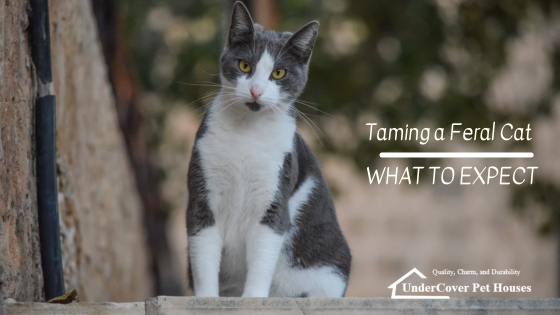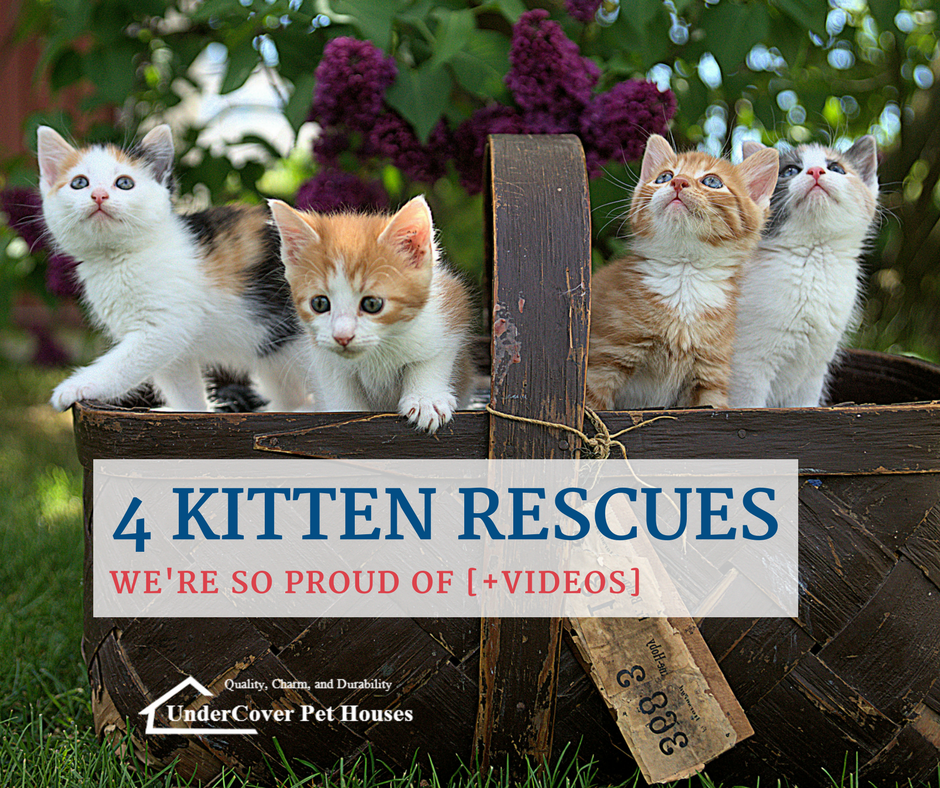 Loading... Please wait...
Loading... Please wait...Blog - cat rescue
Taming a Feral Cat: What Can Happen
Posted by Danny MacDonald on 2023 Oct 7th

Taming a feral cat can be a journey of both challenges and deeply satisfying rewards. These cats, either born in the wild or abandoned by owners, live in loneliness, with little to no contact with people.
As a result, the process of taming a feral cat demands patience and dedication.
Taming a feral cat involves trapping and providing a safe shelter, consulting with a veterinarian for essential check-ups and TNR (Trap-Neuter-Return), and gradually introducing human interaction. The timeline for this can be a couple of weeks to several months or even up to a year.
In this blog post, we delve into the experiences you can get when you successfully rescue and tame outdoor cats. Let’s discover rewards and challenges that’s tied to it.
5 Rewards of Taming a Feral Cat
Here are rewards you can get when you tame a feral cat:
1. Saving lives: By taming and adopting a feral cat, you provide a better life for and help reduce the feral cat population, which helps reduce the strain on animal shelters.
2. Fulfilment: Witnessing a feral cat transform from a fearful creature into a trusting and affectionate companion is rewarding. The bond between you and the cat you rescue is highly fulfilling.
3. Personal growth: Taming feral cats can be a transformative experience because it teaches patience, compassion, and empathy. It also provides you with a sense of accomplishment and purpose.
4. Community Impact: Feral cat rescue positively impacts the community by reducing the number of stray and abandoned cats, which enhances the overall well-being of feral cats. This ultimately promotes a healthier and safer environment for both humans and animals.
5. Educational opportunities: Feral cat rescue provides opportunities for educating communities about the humane treatment of animals. You can become a feral cat advocate and inspire others to join you.
The Challenges of Taming a Feral Cat
Below are the challenges you can experience when taming a feral cat:
1. Trust-issues: Feral cats are often suspicious of humans. Building trust with them can be a slow process that requires patience and persistence. Rescuers usually take some time checking the cats near their hiding places, offering food, and gradually earning their trust.
2. Aggression: Feral cats are habitually fearful and may be aggressive when approaching. They can hiss, scratch, or bite. Preparing for such reactions and taking the necessary precautions to avoid injury would be best.
3. Medical issues: Feral cats regularly suffer from various health issues, including infections, parasites, injuries, and malnutrition due to their outdoor lifestyles. Cat rescuers and volunteers need to provide them with food, shelter through set up feeding stations as well as provide essential medical care, including vaccinations and neutering, which require finances.
4. Socialization: Since they’re not used to human interaction, feral cats may find socializing challenging. It’s therefore essential to invest considerable time in gradually adjusting them to human touch and companionship.
5. Rehabilitation setbacks: Taming feral cats can have occasional lapses, whereby a cat that seems to be making great strides may suddenly revert to fearful behavior. If this occurs, it’s essential to remain patient and adaptable.
Bottom Line
The dedication and compassion of feral cat rescuers and volunteers make the world a better place for these felines and contribute to the well-being of your community.
Despite the challenges, taming a feral cat can be a gratifying undertaking. Not only does it change and improve cat lives, but it also provides fulfilling benefits to those who embark on this noble mission.

Volunteering with a Feral Cat Rescue: What to Expect (Part 1)
From the heartwarming moments of saving a scared feral kitten to the challenges of gaining their trust, volunteering and being part of feral cat rescue is a rewarding endeavor that helps these vulnerable feline creatures and enriches your own life.In this comprehensive guide, we'll dive into the depths of feral cat rescue and provide you [...]

Exclusive Interview with Diane Stevens of Furry Friends
Based in Vancouver, WA, Furry Friends is a nonprofit, no-kill cat rescue organization that rescues and adopts out homeless, relinquished, and abused cats in Clark County, Washington. Each year, they rescue, care for, and rehome about 150 cats. For volunteer Diane Stevens, working with Furry Friends was the retirement she'd always dreamed of. We asked Diane, now [...]

4 Kitten Rescues We’re So Proud Of [+ Videos]
With kitten season just around the corner, cat shelters everywhere are gearing up for the annual surge of newborn kittens. Each year, volunteers and staff log countless hours raising funds, buying supplies, and providing 24-hour care for at-risk kittens. We are grateful for the amazing work these folks are doing. Today, we'd like to share with you [...]

June is Adopt-A-Cat Month!
It’s Adopt-A-Cat Month!Designated by American Humane, June is Adopt-A-Cat Month! Every spring, thousands of kittens are born…some to domesticated cats, and some to feral cats. With an influx of newborn kittens, your local cat shelter needs to match more cats with their forever families.Here are our top 5 reasons to adopt a shelter cat.1) You can save a [...]

Feral Cat Success Stories: Good Mews
Established in 1988, Good Mews is Georgia’s oldest cage-free, no-kill cat shelter. We asked Nancy Riley, who serves on the board of directors, to give our readers the inside story on its success.1) Tell us more about how Good Mews started. Who were its founders, and what sparked its beginning?Our founder, Gloria Skeen, was a flight attendant who recognized a stray [...]
